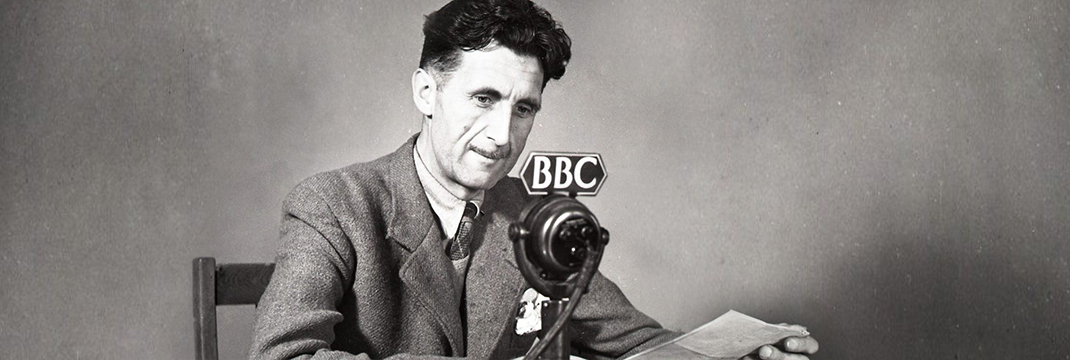
“From a very early age, perhaps the age of five or six, I knew that when I grew up I should be a writer. Between the ages of about seventeen and twenty-four, I tried to abandon this idea, but I did so with the consciousness that I was outraging my true nature and that sooner or later I should have to settle down and write books” (Orwell).
George Orwell (real name – Eric Arthur Blair) was born on June 25, 1903, in India, in the British colonial family. His father worked in the Indian Customs Department and came from an impoverished aristocratic family. In 1921, Eric Blair graduated from Eton College. Among his favorite authors were Rudyard Kipling, Charles Dickens, William Makepeace Thackeray, and Herbert Wells. The beloved hero of the writer was Robin Hood. He began to dream of a writing career back in six years. As early as 11 years old, Orwell has published a patriotic poem in one of the newspapers. In 1923, his first “adult” publication came out (BBC).
Me: What college have you graduated? Have you enjoined the student years of yours? Why?
GO: I studied at Eton in 1917-1921 and was lucky to receive a scholarship, although I was doing very little. The family was not rich, so I had the fate of being poor “student-scholar” in the inferior English school. However, I still managed to go to Eton and won an absolute victory in a difficult contest. Educational institution of that time was full of hypocrisy and snobbery. Most likely it forced me to stop my student life. I do not think that Eton had a decisive influence on my destiny (Burton).
Me: Did you have an alternative to Eton or you just had the other plans? What were you doing next?
GO: From 1922 to 1927, I served in the Indian Imperial Police, in Burma. I left the service in part because of the climate, which destroyed my health, and partly due to the fact that even then I had a vague consciousness of the writer’s vocation. I could no longer serve imperialism and predatory nature I realized. Returning to Europe, about one and a half years I lived in Paris and wrote novels and short stories that no one wanted to publish. When my savings ran out, I spent several years living in extremely harsh poverty, replacing a dishwasher, among other professions, a tutor and a poor teacher of a private school. I was a salesman in a London bookshop for about a year, which was interesting in itself, but I had the urge to live in London, which I could not stand. I had the opportunity to live on the fees since 1935. At the end of this year, I moved to the village and opened a small shop. It barely paid for itself but gave me a shopping experience that would be useful, if I wanted again to do something in this direction. In the summer of 1936, I got married. At the end of that year, I went to Spain to take part in the civil war, and my wife soon followed me (Crick).
Me: When and how have you discovered the affection for literature and writing?
GO: I was the middle of three children in the family. We all lived five years apart. In addition to the age of eight, I almost did not see my father. For these and other reasons, I grew up quite a lonely child. Loneliness has developed my peculiar habit of writing stories and talking to imaginary interlocutors. I think from the very start my literary pretensions were steeped in feeling isolated and undervalued. I knew that I owned a word and had enough willpower to face unpleasant facts. I felt it created a private world in which I could reclaim what was lost in the everyday world. Nevertheless, serious (i.e. seriously written) works of my childhood and adolescence were not half-dozen pages. Whether in four or five years, I wrote my first poem. My mother wrote it down under my dictation. I do not remember it. I remember only that it was about a tiger and the tiger’s teeth were like “chairs” (not a bad comparison). I think it was a plagiarism of Blake poem Tiger, tiger about. At eleven years old when the war of 1914-1918 started, I wrote a patriotic poem which was printed in the local newspaper. Becoming older, I occasionally wrote bad and usually unfinished “poems about nature” in the style of poetry of the Georgian period. I tried a couple of times and wrote a story that was a complete failure. Here, perhaps, is the list of products to think seriously that I wrote at the time. However, all this time I was engaged in literary activities. I had a lot of nonsense that was composed “in the event”, which I wrote quickly, easily, and without much pleasure. In addition to school work, I wrote vers occasion – partly comedian verses that were composed with a rate that is unattainable now to me. At fourteen, I wrote a whole rhyming play in imitation of Aristophanes about in a week, and I helped to edit a school magazine, both print, and manuscripts. These magazines were the most miserable specimen of a parody of nonsense that could be imagined. However, I had with them much fewer concerns than with the most primitive newspaper articles today. Along with all of this for fifteen years and maybe more, I was engaged in a literary work of a different kind. All the time I wrote the endless story, a kind of diary, which existed only in my head. I think this is a common activity of children and adolescents. As a child, I imagined myself as Robin Hood, who was the hero of exciting adventures. My story has lost narcissism very soon, and coarse features were more becoming a description of what I did and saw. I could unwind in the brain for a long time such a passage “He widely opened the door and entered the room. The yellow beam of sunlight, breaking through the muslin curtains, slid on the table next to where the ink was laying half-open box of matches. He put his right hand in his pocket, crossed the room and went up to the window. At the bottom of the street striped cat chased fallen leaves”. This habit lasted to twenty-five years. Although I had to look, and I was looking for the right words, it seemed to me that I was doing these desperate efforts against my will under the influence of some kind of compulsion from outside. I guess my story was to bear the traces of the style of those writers whom I have admired in particular age, but as far as I remember, it always kept a clear and descriptive thing (Orwell).
Me: Wow. You were and I guess still are too honest to yourself. Who influenced or inspired you? Can you name the figures you admire?
GO: Writers, whom I never tire of admiring, are Shakespeare, Swift, Fielding, Dickens, Charles Reade, Samuel Butler, Zola, and Flaubert, of contemporaries James Joyce, Eliot, and Lawrence. I think that Somerset Maugham had the greatest impact among contemporaries on me. His art is direct and has no frills narrative (Rubin).
Me: Do you have other hobbies to writing?
GO: In addition to writing, I love gardening most. I like English cuisine and English beer, French red wines, Spanish white wines, Indian tea, strong tobacco, fireplaces, candles, and cozy armchairs. I do not like big cities, noise, cars, radios, canned food, central heating, and modern furniture. My wife’s tastes almost the same as mine. I have useless health, but it never stopped me from doing what I want to do (Kunitz).
Me: What is your attitude to politics?
GO: What I saw in Spain and later in the life of left political parties has given me an aversion to politics. I was at one time a member of the Independent Labor Party but left it at the beginning of this war. I have come to the conclusion that its position is absurd and only helps to Hitler. I definitely sympathize with the “left”, but I am convinced that a writer can keep honesty, just being free from party slogans (Kunitz).
Me: Still some of your works are impregnated with political meanings. Is this coming itself? What does writing a masterpiece means to you?
GO: I noticed that everything is as if I am inspired by public tasks only. I would not like to have a reader who got this opinion. All writers are vain, selfish, and lazy. A mystery always lays at the very bottom of their motives. Creating a book is a terrible and soul exhausting struggle like a long fit of painful illness. No one would undertake such a thing if it is not encouraged by a demon. A demon that can neither understand nor have a resistance to it. And as far as we can judge, this demon is the same instinct that makes a baby screaming, attracting the attention of adults. At the same time, the other is also true that you cannot write anything interesting if it does not try to go all out to get rid of yourself. Good prose is like a windowpane. I cannot say with certainty which of my motives for creativity is the strongest, but I know which one of them I have to follow. Looking back to the point, I underline in my works lack of political purpose. There have always been born lifeless books. I indulged in the writing of the most magnificent passages, sentences without meaning, beautiful epithets and filled the pages with platitudes (Orwell).
Me: Did political aspects play a significant role in your writing creativity?
GO: It is ridiculous to think that anyone is able to avoid such issues. Anyone under this or any other sauce writes about them. The only question is which side is taking and what approaches are following. The more you become aware of their political leanings, the more opportunities you have to act through political means, without bringing the sacrifice of their aesthetic and intellectual integrity. What I most wanted to the last ten years, this is to turn the political literature of the arts. Starting line for me is always a sense of belonging and injustice. When I sit down to write a book, I say to myself, “I want to create a work of art”. I write it because there is some lie that I need to expose, some fact to attract attention. My main concern is to try to be heard. But I cannot write a book or even a great magazine article if they do not bring aesthetic experience. Anyone, who takes the trouble to examine my work, will notice that even the sound and blatant propaganda will be considered inappropriate by a professional politician. I cannot get rid of the vision of the world that I have learned from childhood. However, I want to do it. As long as I am alive and well, I do not stop to think seriously about prose style, love the earth, and receive pleasure from material things and from the fragments of what are called useless information. There is no point in trying to suppress my all. The problem is to reconcile the inherent me likes and dislikes with the public, for the most part, common activities that this age inevitably imposes on us. It is not easy. There are problems with composition and language. A new problem is posed truthfulness to give just one example showing what not previously encountered difficulties arise in the process. Homage to Catalonia is my book about the Spanish Civil War, of course, is overtly political work, but mostly it was written with certain care and an eye to the literary form. It does not suppress own literary impulses. I tried hard to tell the truth. But among other things, there is a long chapter in the book, full of extracts from newspapers and other material that protects the Trotskyites, the accused while in cahoots with Franco. It is obvious that such ahead after a year or two will pay interest of any ordinary reader and destroy the book itself. A critic has read me a lecture about it. “Why do you have stuffed the book with all this nonsense? In fact, you have turned a good book in the purest journalism”. But I knew that perfectly innocent people have been falsely accused. If I were not outraged by this fact, I would probably never have written this book (Orwell).
Afterword
The war began. Terminally ill, unable to fight in the front row, the writer still arranged observer in air defense. No matter what, George did not stop writing. In 1945, he published his novel Animal Farm, written in a rare genre of political fable. The disease progressed. That time doctors were forced to admit their impotence. Before the death, Orwell, on January 1950, gave out the 1984 novel that is the crown of his writing activity, a decent result of heavy, complicated, and frustratingly short life. “War – is World,” “Freedom is Slavery,” “Ignorance – the Power!” These key formulas and concepts of any dictatorship and totalitarianism are brilliantly deduced by Orwell in his books.



